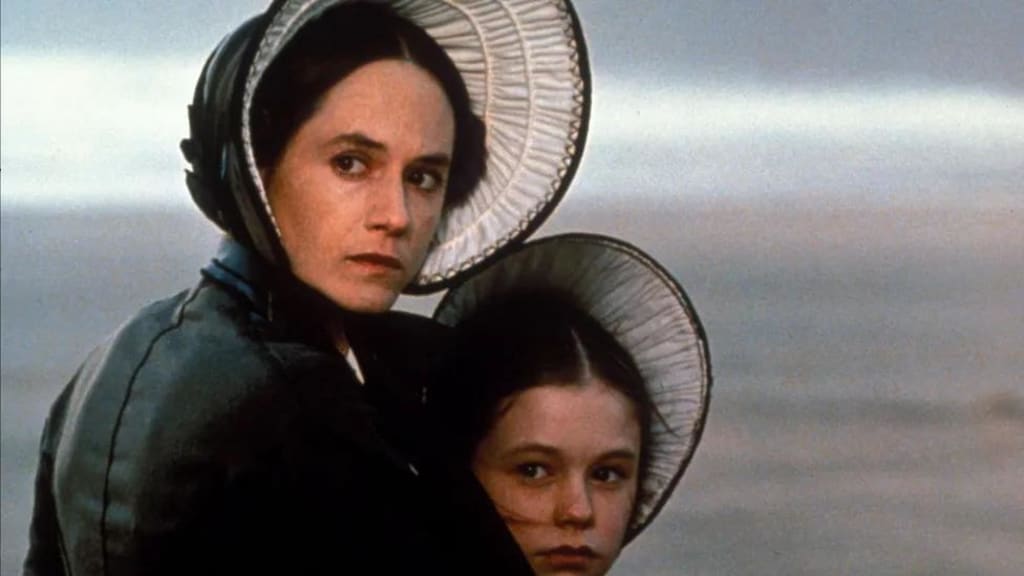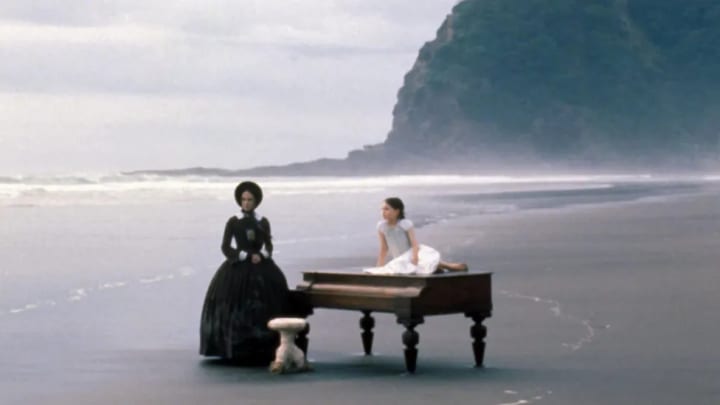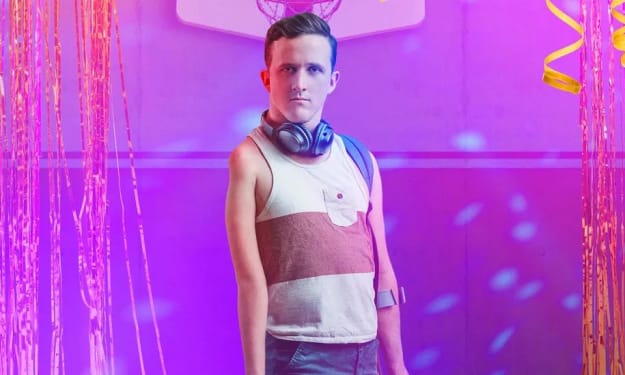Why The Piano is the greatest film directed by a woman
Jane Campion's stunning 1993 classic was the top of a survey of 368 critics in 84 countries. reveals why it is a deserving winner.

In 1993, Jane Campion made history when she became the first woman (and the first New Zealander) to receive the prestigious Palme d’Or at the Cannes Film Festival. Her haunting period romance The Piano shared the award with Chen Kaige's Farewell My Concubine, but in BBC Culture’s critics’ poll of the 100 greatest films by women, Campion doesn’t have to share the prize a second time: The Piano was chosen as the number one film in a remarkable list that showcases more than 100 years of female filmmaking.
Influenced by Jane Mander’s The Story of A New Zealand River as well as the French folktale Bluebeard, Campion’s story is of a Scottish pianist named Ada McGrath (Holly Hunter), an elective mute who is sold off by her father into a marriage with New Zealand frontiersman Alisdair Stewart (Sam Neill). She travels to the remote island with her young daughter Flora (Anna Paquin), but after her new husband trades her piano to his friend George Baines (Harvey Keitel), Ada is furious, and resolves to reclaim her beloved instrument through a bargain with the new owner. Romance, jealousy and heartache play out against a lush, unforgiving backdrop of Antipodean forestry and coastline – while Flora desperately searches for the agency and happiness that have so far eluded her.
The agency afforded by Campion to Ada and Flora McGrath means they aren’t perfect, but they are complicated, fascinating and real
It’s an exquisitely beautiful film, from Michael Nyman’s score of sombre and soaring piano and strings compositions to Holly Hunter’s performance, which rightly earned her the 1994 Academy Award for best actress. It’s hard to imagine anyone else playing Ada now, but Sigourney Weaver was actually Campion’s first choice. When she was unavailable, Isabelle Huppert met with the director to discuss the role, but ultimately it went to Hunter (something Huppert has expressed regret over).
We understand some of Ada’s thoughts through tender voiceover monologues which bookend the film like a fairytale, but mostly it is down to Hunter’s physicality to match Neill and Keitel without words. So much is said in a glance, in a gesture, in the way Baines examines a small hole in Ada’s stockings. Similarly, Anna Paquin – who was just nine years old at the time of filming and made Oscar history when she won best supporting actress the following year – gives a performance for the ages, as a child forced to grow up too quickly, occasionally veering into brattish outbursts due to the stress placed on her. The agency afforded by Campion to Ada and Flora McGrath means they aren’t perfect, but they are complicated, fascinating and real.

For New Zealand film critic Maria Lewis, Campion’s cultural identity is part of what makes The Piano so special: “Jane Campion has always centred the female narrative. Not the female narrative as Hollywood knows it, but the kind that's familiar to a New Zealand and even an Asia-Pacific audience: women who are unusual, women who are complicated and talented, women who are weird, women who have overcome, women who march to the beat of their own drum – or piano, if you will." Certainly it feels as though the specificity of The Piano is part of its unique charm – it’s a fairytale, but one so steeped in the harshness of reality, it feels at once familiar and bracingly different from anything that came before it.
Female oppression and desire
The history of women behind the camera is a history of oppression, as filmmaking, like so many professions and artistic endeavours, was once the reserve of well-connected, well-off white men. This bias toward films made by one narrow set of creatives has in turn shaped our collective film history, but the results of this poll (and last year’s 100 greatest foreign-language films) prove that there is a wealth of talent out there, waiting to be discovered and recognised. How apt, then, that The Piano – a tale of female desire and oppression at the hands of the patriarchy – should resonate so deeply with viewers, more than 25 years since it was made.
The Piano arrived at a time when most films depicting female sexuality were directed by men. I’ve always considered Campion’s vision ground zero for the female gaze – Melissa Silverstein
Some 8% of the 368 voters in the critics’ poll chose The Piano as their number one film. Among them was Melissa Silverstein, Founder and President of Women and Hollywood, who cites the groundbreaking nature of the film as a reason for its resonance. “It might be one of the first films that I saw where I fully understood what it means for a director to have a vision,” she says. “Nothing is said. It is all felt. The Piano arrived at a time when most films depicting female sexuality were directed by men. I’ve always considered Campion’s vision ground zero for the female gaze.”
Perhaps the greatest indication of The Piano’s legacy is that it continues to resonate with and inspire new audiences. Film writer Laura Venning wrote her undergraduate thesis on Jane Campion, after discovering The Piano at the age of 16. “I was just getting interested in film and beginning to dutifully make my way through the canon, though I truthfully didn’t feel much of a personal connection with any of it at that point,” she tells BBC Culture. “When I watched The Piano for the first time I was expecting something restrained and melancholy, like Merchant Ivory, so I was astonished and a little unnerved to be transported into this dark, transgressive Gothic story where female desire and female creativity are unstoppable forces.”
Since The Piano, Jane Campion has gone on to make further films and television series that focus on female oppression and desire, as well as the machinations of power in remote New Zealand communities. But The Piano continues to beguile, with its unpredictable heroine and sense of deep sadness sitting alongside tender romance. It is a piercing fable that speaks to the universal desire to love and be loved. Not only is it a beautiful, heartbreaking story in its own right, but a worthy winner of this poll, demonstrating just why it is so important that we continue to strive to make the film industry – and by proxy, the stories we tell – as diverse and remarkable as life itself.
About the Creator
Alessandro Algardi
"She was a girl who knew how to be happy even when she was sad” and that's important you know.






Comments
There are no comments for this story
Be the first to respond and start the conversation.